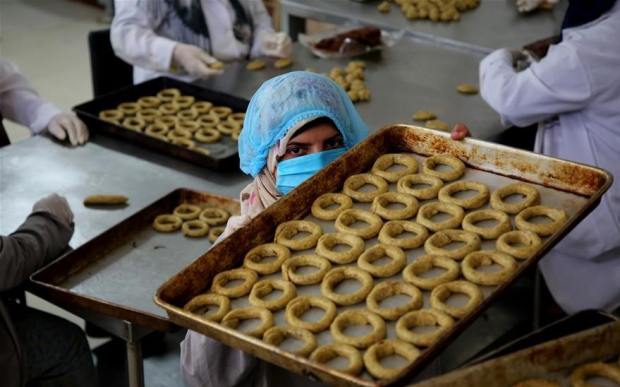The Palestinian economy is vulnerable. It has been exposed to a series of ongoing shocks that have weakened its ability to be resilient against internal and external crises, like the pandemic. Official statistics are crucial to understanding the effects of such crises on vulnerable sectors of the population.
A Harsh Reality
The Palestinian economy is micro — with the majority of establishments employing less than 10 workers, and the informal sector making up about a third of the economy. It is primarily a service-based economy, and also a consumer-based economy with a consumption rate of about 116% of the gross domestic product.
Our fragile Palestinian economy faces additional challenges hindering its development — mainly by Israeli occupation’s measures involving limited control of the land and no control on borders. These deprive the Palestinian economy of the most basic resources needed for production. In fact, 60% of the West Bank’s territory is fully controlled by “Israel” in the form of Area C [1], and a complete siege has been enforced on the shattered Gaza Strip by “Israel” for more than a decade. This most populated area in the world has witnessed three Israeli wars since 2008. Additionally, the Palestinian clearance revenues [2] are repeatedly used by the Israeli occupation as a tool of economic pressure.
This harsh economic reality directly affects lives. Those most affected are the most vulnerable sectors of society such us Palestinians living in refugee camps [3] and in Area C. This area is home to an estimated 180,000-300,000 Palestinians who are suffering from demolitions and forced evictions that deprive people of their homes and disrupt livelihoods, leading to entrenched poverty and increased dependence on aid.
The Palestinian labor market pre-COVID-19
We have around one million workers in Palestine; about two thirds of them work in the private sector, 21% in the public sector, and 13% in “Israel” and the Israeli settlements [4]. Those in the latter group have no labor rights or work sustainability. About 29% of those employed in the private sector receive less than the minimum wage (1,450 NIS = USD 426 per month), and to make matters worse — 57% of the employed are considered informal employees, meaning they do not receive formal basic work rights such as employment contracts, paid leave, sick leave or social retirement.
The need for relevant data
The fragile economy faced even more tragic conditions after the COVID-19 pandemic hit Palestine and the rest of the world. The Palestinian Central Bureau of Statistics (PCBS) took the initiative to support the Government by extracting relevant data and performing economic forecasting to measure the impact of the pandemic. This work is important for evidence-based decision-making and intervention during this critical time. This process was done in partnership and consultation with all stakeholders, including Government Ministries and International Partners like the World Bank and United Nations agencies.
During the lock-down, face-to-face data collection was no longer an option and we had to come up with creative ways like hand held devices, phones, and the use of registers when available. We also performed a rapid assessment to offer real time data capturing the effect of the pandemic. To ensure accuracy, the data production process is done in abidance with international data quality standards referred to as the Statistical Data Quality Framework which includes many approaches for data quality assurance and data monitoring tools.
It is vital for governments to have data on the most marginalized groups which are expected to fall deeper into vulnerability due to the pandemic. In Palestine, this includes women heading households, workers of the informal sector, and workers at Israeli settlements, refugees, and the population in Area C. Governments need to have up-to-date databases to make interventions, such as providing urgent wage subsidies, medical and food supplies, etc.
COVID-19’s impact
Data collection efforts reveal that the pandemic’s lockdown measures led to a 5% decline in GDP during the first quarter of 2020. Our projections also estimate the Palestinian economy is expected to register a loss of USD 2.5 billion, which will greatly affect the economy’s ability to recover.
Through the statistics, we see that lock-down measurements in response to the pandemic paralyzed the Palestinian labor market. Around 600 thousand employees in the private sector were forced to stay at home and their main sources of income were either wiped out completely or, in the best cases, lowered. About one fourth of the 133,000 workers employed in “Israel” and the Israeli settlements stopped working completely.
Double effect on fragile and marginalised groups
Official data can provide crucial insights to policy makers — such as how this pandemic has directly affected vulnerable groups included in the labor market, especially households led by women comprising 11% of all families in Palestine. Women in this sector are desperately seeking any chance to meet their families’ basic needs.

The lockdown has widened the poverty gap. Families who were on the edge are falling into poverty, leading to the emergence of new groups of poor people, especially in refugee camps and Area C. Around 109,000 women working in the private sector have lost their jobs due to closure measures. It can also be noted that women working in the private sector regularly face more challenges as compared to men, such as lower wages and discrimination in promotions and advancement of job positions. Providing such figures can directly affect the Government’s decisions to shift aid to these groups.
Why should world leaders invest in data infrastructure?
Investing in enhancing official statistics infrastructure and systems is relevant today more than ever, leading to better-aimed and justified investments in human development aspects like health and education. I think this pandemic has been a lesson learned for governments on the importance of data infrastructure. A global lesson has been given to us for the future to help us create better social and economic protection systems so that no one is left behind.
--------
[1] Area C refers to areas of the West Bank under the full control of “Israel” under the Oslo II agreement.
[2]Clearance revenue: refers to taxes collected by Israel on Palestinian imports on behalf of the Palestinian Government, since Israel forces all Palestinian imports (and its exports as far as allowed by Israel) to go via Israel. These funds should be transferred monthly to the Palestinian Government according to Oslo II agreement.
[3] Palestinian refugee camps are camps that were set up by the United Nations Relief and Works Agency (UNRWA) to accommodate Palestinian refugees, who were forced to flee or were expelled from their homes during the invasion of Palestine in 1948 and in 1967.
[4] Illegal “under international law” colony entities built on Palestinian land





